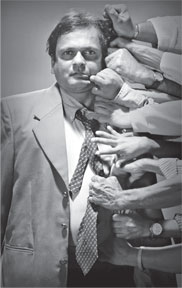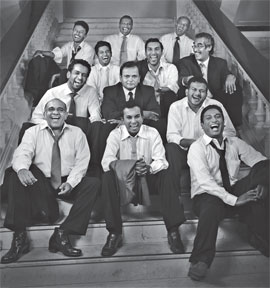Dolahak and its discoursing of 'Actus Reus' and 'Mens Rea'
By Dilshan BOANGE
US playwright Reginald Rose's Twelve Angry Men has enjoyed a Sri
Lankan embrace from theatre goers in Colombo who have shown positive
responses to Dolahak -the Sinhala adaptation of Rose's play produced and
directed by Athula Pathirna whose directorial debut has received a
remarkable reception since it first went on the boards late last year.
 The story in a nutshell (of nutshells) is about the deliberation of a
jury of twelve men over the guilt or innocence of a sixteen-year-old boy
charged with first degree murder, and the victim being the boy's own
father. The ensemble of characters had a captivating mix of emotions
spiralling in many directions, the most forceful and projectile
portrayals being delivered mainly by W. Jayasiri, Dhamapriya Dias,
Sampath Jayasinghe and Vishvajith Gunasekera. The story in a nutshell (of nutshells) is about the deliberation of a
jury of twelve men over the guilt or innocence of a sixteen-year-old boy
charged with first degree murder, and the victim being the boy's own
father. The ensemble of characters had a captivating mix of emotions
spiralling in many directions, the most forceful and projectile
portrayals being delivered mainly by W. Jayasiri, Dhamapriya Dias,
Sampath Jayasinghe and Vishvajith Gunasekera.
Trial by jury
The system of 'trial by jury' where laymen sit in judgement over a
person charged with wrongdoing shows a method of being judged by one's
peers who would be better able to decide from a more 'societal vantage'
on the possibility of guilt or innocence of the person standing trial.
In a murder case the guilt of the accused must be proven beyond
reasonable doubt. And for a crime to be established as having been done,
two essential elements need to be established 'beyond reasonable doubt'
according to principles of criminal law. These two principles are -Actus
reus and Mens reas which basically translate as 'wrongful act' and
'wrongful mind' respectively. For a 'murder' to have been committed in
the eyes of the law the accused must be proven of having performed an
act that results in the death of a person as well as having done that
act with the intention of causing the death of the deceased or killed
person.
Which comes first?
What I find interesting in the manner in which the jury deliberates
is that it deals with the gamut of human emotions and perspectives that
each juror brings in to form his stance on the matter and (its
subsequent change) how the one voice of logic (the juror played by
Vishwajith G) that sets the ball rolling sets the stage for a layman
discourse to deal with the concepts of the two principles of - Actus
Reus and Mens Reas.
The motive for the boy to have committed the murder goes into the
aspect of Mens Rea that leads the discussion to dwell into how the
criminal intention of killing the father would have occurred and of
course the physical act of killing is the 'seemingly factual' stabbing
done by the accused.
 In establishing a crime as a murder the accused must first be proven
of having fulfilled the first of the two ingredients Actus Reus; if that
cannot be established beyond reasonable doubt then there is no grounds
on which the accused can be declared guilty. In establishing a crime as a murder the accused must first be proven
of having fulfilled the first of the two ingredients Actus Reus; if that
cannot be established beyond reasonable doubt then there is no grounds
on which the accused can be declared guilty.
The father's boy had been stabbed to death that much was obvious and
established the murder weapon, a switch blade, was also at the scene of
the crime but without any fingerprints and identified as the same type
of blade the boy had bought from a wayside vendor which he claims he had
lost. Interestingly, the evidence brought forward by the prosecution at
the trial had convinced all but one of the jurors that the boy was first
and foremost guilty of Actus Reus -the wrongful act.
The stabbing is attributed to the boy (the accused) yet it is through
looking more closely at the factors that would link up to whether if the
boy was guilty of Mens Rea or whether there is really a basis for Mens
Rea that the highly contentious deliberative process unfolds.
The possible motive to kill
Many of the jurors take into consideration the fact that the boy was
slapped by the father and the statement of the witness who said he heard
the boy yell out Mama tho maranawa! (I am going to kill you) as
sufficient reason for the boy to have been of a state of mind to commit
the murder.
Upon clearly examining the facts the doubtfulness of whether this
claimed yell could have actually been heard by the witness who would
have had to have heard it over the noise of a moving train that passed
outside the building the crime occurred creates room for sufficient
doubt to brew in the minds of some of the jurors if in fact Actus Reus
could be attributed to the boy.
True that the father had been stabbed to death, yet to accuse the boy
of having done it doesn't seem so clear cut when re-examining the
witness testimonies, one of which is from the occupant living in the
apartment just above the flat where the crime occurred.
And the other, an eyewitness account from the old woman who claims
she had seen the crime occur from her apartment across the railroad
(directly opposite the flat the boy and the father inhabited) through
the open windows of the last two carriages of the moving train also is
argued out as being implausible due to the fact that she showed signs of
being a person who wears spectacles and would have been unlikely to have
had her spectacles on to see the incident clearly enough to know the
assailant as being the boy himself since she had said she was trying to
get to sleep and happened to be in bed when she heard the commotion
erupt.
Upon re-examination of the evidence
The jurors as laymen, examine the case and the evidence presented for
its logicalness systematically, amidst certain prejudices and emotional
turbulences which sought to establish Actus Reus as performed by the boy
based on a supposition that Mens Rea is more or less obvious from the
outset.
Finally, the dubiety in the two testimonies becomes visible and the
factualness of the 'evidence' creates room for obvious doubt (more than
merely 'reasonable') to stir up and question whether the boy can be
found guilty of having committed the crime. What can be understood here
from a point of dissecting the discourse in comection with the earlier
mentioned criminal law principles is that the jury feels Actus Reus
cannot be proven beyond reasonable doubt and therefore the boy's
acquittal is a unanimous decision.
A theatrical critique of society
What one can find interesting in this US play written in the 50s is
that it sends out undertones of class based prejudices prevalent in that
society which some may have seen as warfare to a certain extent between
the downtrodden ghetto stratum and the lower middle class and above.
While the scenario with a jury can be a window for society to see how
their own (possibly) treat a civic duty where the life of another hangs
at stake, it also creates the two fold view -one is a pessimism of how
crude and thoughtless people may be and not care to look beyond what may
seem the obvious, not wanting to tire themselves and have things done
and over with to their convenience.
And the other is that a ray of optimism that comes out in the
character played by VG that says out there are also people who care
enough for both people and the duty entrusted to him by society to see
how best he would be able to aid the process of justice. |

